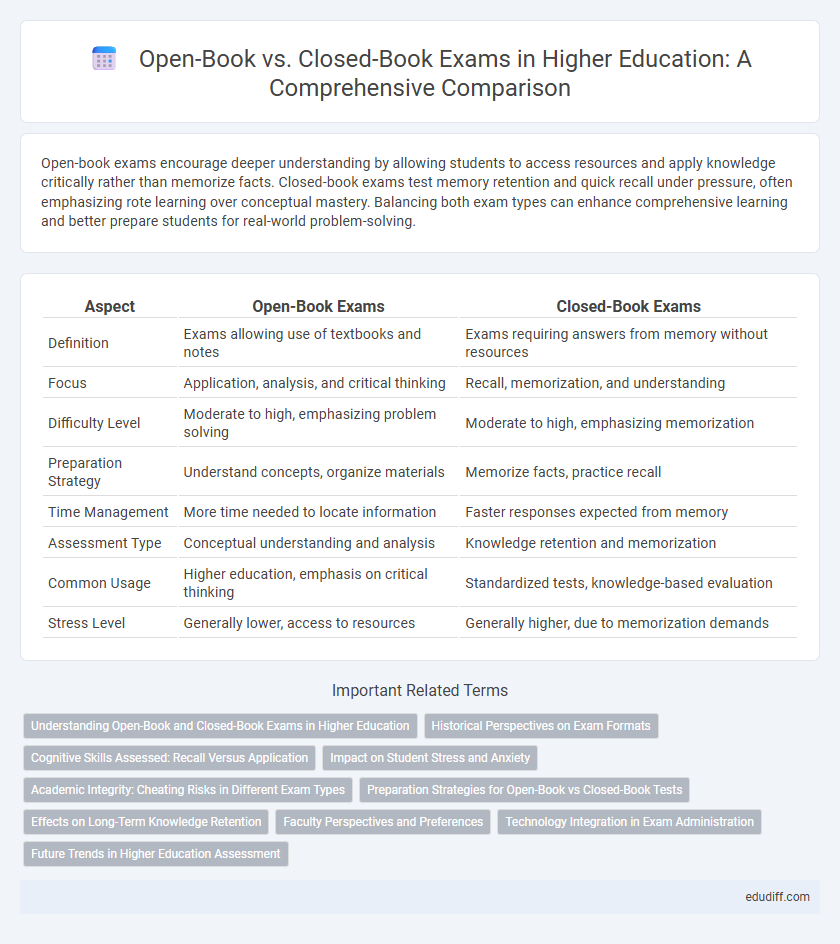Open-book exams encourage deeper understanding by allowing students to access resources and apply knowledge critically rather than memorize facts. Closed-book exams test memory retention and quick recall under pressure, often emphasizing rote learning over conceptual mastery. Balancing both exam types can enhance comprehensive learning and better prepare students for real-world problem-solving.
Table of Comparison
| Aspect | Open-Book Exams | Closed-Book Exams |
|---|---|---|
| Definition | Exams allowing use of textbooks and notes | Exams requiring answers from memory without resources |
| Focus | Application, analysis, and critical thinking | Recall, memorization, and understanding |
| Difficulty Level | Moderate to high, emphasizing problem solving | Moderate to high, emphasizing memorization |
| Preparation Strategy | Understand concepts, organize materials | Memorize facts, practice recall |
| Time Management | More time needed to locate information | Faster responses expected from memory |
| Assessment Type | Conceptual understanding and analysis | Knowledge retention and memorization |
| Common Usage | Higher education, emphasis on critical thinking | Standardized tests, knowledge-based evaluation |
| Stress Level | Generally lower, access to resources | Generally higher, due to memorization demands |
Understanding Open-Book and Closed-Book Exams in Higher Education
Open-book exams in higher education allow students to access textbooks, notes, and digital resources during assessments, promoting critical thinking and application of knowledge rather than rote memorization. Closed-book exams rely solely on memory recall, testing students' ability to retain and reproduce information under time constraints. Understanding the strengths and challenges of each format helps educators design assessments that align with learning objectives and accurately measure student comprehension.
Historical Perspectives on Exam Formats
Historical perspectives on exam formats reveal that open-book exams gained prominence in the mid-20th century as educational philosophies shifted towards assessing critical thinking over rote memorization. Closed-book exams, rooted in ancient academic traditions, emphasize knowledge recall and time-pressured problem-solving, reflecting early pedagogical priorities. Recent research highlights how open-book assessments align with modern curricula aiming to develop analytical skills and real-world application.
Cognitive Skills Assessed: Recall Versus Application
Open-book exams primarily assess higher-order cognitive skills such as analysis, synthesis, and application, enabling students to interpret and apply information rather than merely recall facts. Closed-book exams emphasize memory recall and the accurate reproduction of knowledge under time constraints, testing students' ability to retrieve information without external resources. This distinction influences the depth and type of learning strategies students engage in, with open-book formats encouraging critical thinking and problem-solving skills essential for advanced academic and professional success.
Impact on Student Stress and Anxiety
Open-book exams significantly reduce student stress and anxiety by allowing access to resources, which fosters a more understanding and less pressured testing environment. Closed-book exams often intensify stress levels due to the demand for memorization and recall under time constraints, leading to increased performance anxiety. Research shows that students in open-book formats report lower cortisol levels and improved focus during assessments, highlighting the mental health benefits of this testing approach.
Academic Integrity: Cheating Risks in Different Exam Types
Open-book exams reduce the temptation for cheating by allowing access to resources, shifting the focus to understanding and application rather than memorization. Closed-book exams increase the risk of academic dishonesty due to the pressure to recall information without aid, often resulting in unauthorized collaboration or use of hidden notes. Institutions implement varied monitoring strategies in both exam types to uphold academic integrity and mitigate cheating risks effectively.
Preparation Strategies for Open-Book vs Closed-Book Tests
Effective preparation for open-book exams centers on organizing materials and understanding concepts deeply rather than memorizing facts, allowing quick navigation of notes during the test. In contrast, closed-book exam preparation requires intensive memorization and repetitive practice to internalize information without external aids. Adapting study techniques to the exam format enhances knowledge retention and application under test conditions.
Effects on Long-Term Knowledge Retention
Open-book exams enhance long-term knowledge retention by encouraging deeper understanding and application of concepts rather than memorization. Studies indicate that students engaged in open-book assessments demonstrate improved critical thinking and problem-solving skills over time. In contrast, closed-book exams often promote short-term memorization, leading to faster knowledge decay after the exam period.
Faculty Perspectives and Preferences
Faculty often favor closed-book exams for their ability to better assess students' memorization and understanding of core material under controlled conditions. Open-book exams receive mixed reviews due to concerns over academic integrity and the challenge of designing questions that require higher-order thinking rather than mere information retrieval. Preference tends to align with course objectives, with STEM faculties leaning toward closed-book formats, while humanities departments show greater openness to open-book assessments to encourage critical analysis.
Technology Integration in Exam Administration
Open-book exams leverage technology platforms that facilitate real-time access to digital resources, enhancing academic integrity through advanced proctoring software and automated plagiarism detection. Closed-book exams increasingly deploy secure browser environments and biometric authentication to prevent cheating, ensuring exam conditions remain tightly controlled. The integration of AI-driven analytics provides educators with detailed insights into student performance, optimizing both exam design and administration processes.
Future Trends in Higher Education Assessment
Open-book exams are gaining traction in higher education due to their alignment with critical thinking and real-world problem-solving skills essential for future careers. Advances in digital platforms enable seamless integration of open-book formats, fostering creativity and application over memorization. Predictive analytics and AI-driven assessments will increasingly personalize exam experiences, balancing open and closed-book methods to optimize learning outcomes.
open-book exams vs closed-book exams Infographic

 edudiff.com
edudiff.com